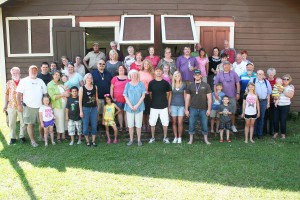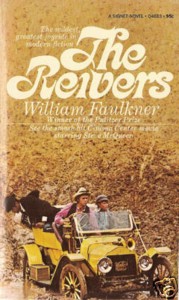As I’ve gotten older, I’ve become increasingly interested in my family genealogy. Whether that’s because Ancestry.com has done some great advertising or I’ve just wanted to understand where I come from, I can’t be completely sure. Regardless, I’ve been fascinated with family history thanks to the internet and digitization of U.S. census data. Last weekend, I was able to connect some dots and answer some questions that the internet couldn’t solve when my parents and I attended the Buffaloe Family Reunion in Atmore, Alabama. So why does that matter? Thanks to some of the information I was able to gather, it turns out that I’m related to the venerable William Faulkner.
Now granted, it’s only by marriage, but the Buffaloe story seems fascinating and it looks as if members of my ultra-extended family were big supporters of Mr. Faulkner during his youth.
The story starts with William Embry (“Billy”) Buffaloe, my great, great, great, great grandfather, born in Wake, North Carolina in 1806. Billy had three brothers – Bryant, Henry, and Burwell. Of the four Buffaloe brothers, it seems that Billy was the only one who fought in the Civil War and all lived fairly long lives for the time period.
Billy’s older brother Bryant married and moved to Marshall County in Mississippi some time between 1840 and 1850. When he died in 1895, he had outlive 6 of his 13 children. His seventh child, George Washington Buffaloe (outstanding name, I must add) fought with the 4th Regiment of the Mississippi Infantry in the Civil War and eventually settled in Oxford. By 1893, George Washington Buffaloe owned a confectionery store and, according to Joel Williamson’s William Faulkner and Southern History, he was a “very popular merchant who sold everything from ice cream to fresh oysters in his downtown store and associated restaurant.” Moreover, “the Buffaloes were clearly in the social swim in Oxford, and they were affluent.”
Here’s where the Faulkner connections begins – Sherwood Butler (who would later become William Faulkner’s uncle) was one of Mr. Buffaloe’s store employees and struck up a romance with the store owner’s 22-year-old daughter, Addie Buffaloe. The two were married in 1894 and had a child (Edwin Ross Butler, William Faulkner’s cousin) in 1902.
While there is one reference to a “mechanical wizard” named Buffaloe in Faulkner’s book, The Reivers (awarded the Pulitzer Prize for Fiction in 1963), Williamson says he never made a clear reference to Sherwood, Addie, or Edwin in any of his writings (though it should be noted that the name ‘Addie’ is also the name of the main character’s mother in Faulkner’s novel, As I Lay Dying).
Although it’s a long shot and it took some winding through family trees to get there, I’ve been surprised to find out so much about my family’s connection to Faulkner and his fondness for his Aunt Addie and Uncle Sherwood. Not only has it renewed my interest in Faulkner, Oxford, and north Mississippi, but it’s brought me one step closer in my search for the Buffaloes.

